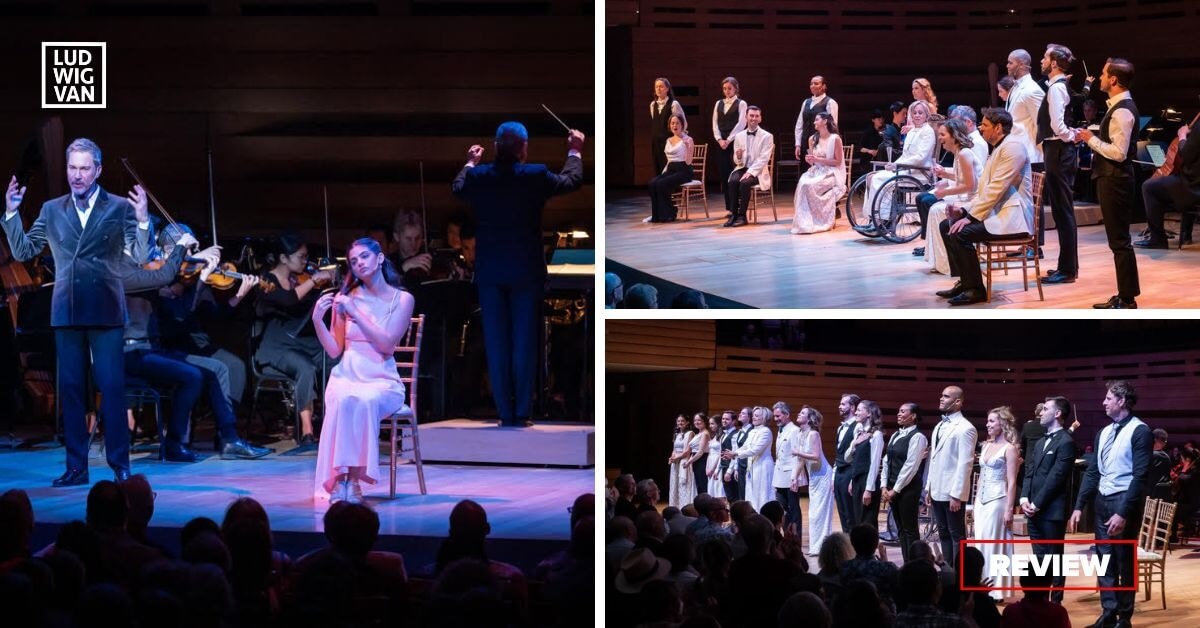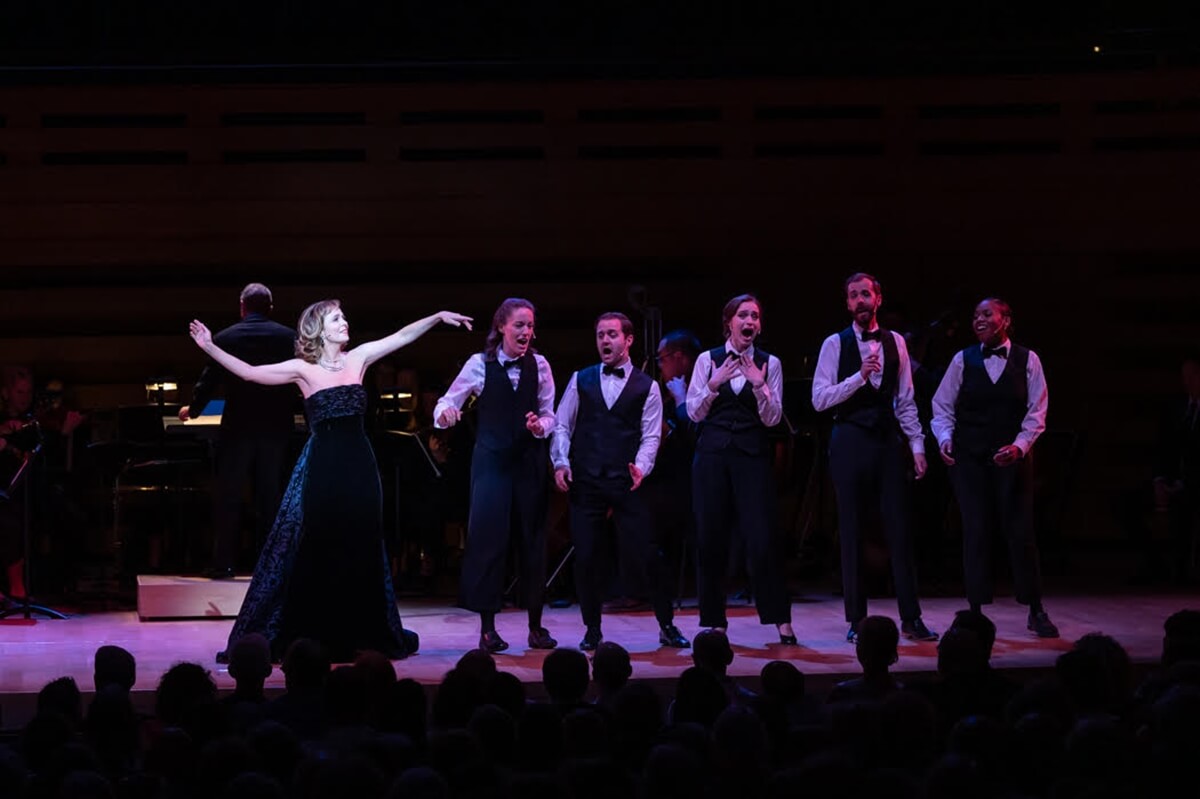
Royal Conservatory of Music/A Little Night Music in Concert, music and lyrics by Stephen Sondheim, book by Hugh Wheeler, orchestrations by Jonathan Tunick, directed by Richard Ouzounian, music direction by David Briskin, Koerner Hall, May 26 to May 28.
Mounting Sondheim musicals in concert seems to becoming a cottage industry for the RCM. First Follies last year, now A Little Night Music this year. Given the packed houses, Sondheim is clearly a winner for this august institution, not to mention a showcase for the 25-member Glenn Gould School Chamber Orchestra, who were terrific, by the way, under the sympathetic but taut conducting of David Briskin.
In the first act of A Little Night Music, we meet the various characters in their various abodes, while the second act takes place at Madame Armfeldt’s villa in the country where the collision of entangled lovers will occur, and some home truths will be revealed.
First, it is important to know that this production is more than a concert. It’s not just music stitched together with a bit of text. Rather, the performance has been skilfully directed by Richard Ouzounian. Yes, the set may just be chairs and tables, but all of Hugh Wheeler’s witty book is spoken, and the singers have to act.
At all times, you felt you were getting a real show. There were even costume changes, cleverly coordinated by Ellie Koffman. The only thing missing were sets, but they weren’t really missing because we had it all with the words and music.
Ouzounian used the full breadth of the Koerner Hall stage in front of the orchestra to create scenes, which were efficiently set up by the five Liebeslieder Singers (the show’s Greek chorus). Stage right, left, middle — the scenes dissolved seamlessly, one into the other, with the songs evolving naturally out of the scenes. The whole stage setup was Ouzounian at his most theatrically acute.
As for the singing actors, it was as if they were born to play the parts. You could call it flawless casting. Particularly noteworthy was everyone’s ability to spout off Sondheim’s rapid-fire infernal internal rhymes with ease.

Cynthia Dale (Desirée Armfeldt) got to show what a truly marvellous actor she is, playing an actor! Her singing role is the smallest, but Desirée does get one song, and it is the killer “Send In The Clowns”, which was delivered with perfect regret and heartbreak, accompanied by Maestro Briskin’s tender conducting. Tender might be a bizarre word, but I can’t think of another that describes the quiet moment of resignation that Dale and the orchestra created. She (and the players) brought down the house.
Eric McCormack (Fredrik Egerman), the esteemed lawyer, and Desirée’s former lover, who is now married to teenage Anne (Sadie Laflamme-Snow), I found a bit off-pitch in his singing, but a wonderful actor in terms of text. Every word he sing/spoke was loaded with meaning. As for Laflamme-Snow, she was suitably giddy and silly as befits her age — and the fact that she is still a virgin after 11 months of marriage.
The other member of the Egerman family, son Henrik, a divinity student, was performed with suitable angst (because he is in love with his stepmother), by Justan Myers, who had the clearest diction of all the acting company. He showed just the right amount of sexual confusion and raging hormones.
Fiona Reid as Desirée’s mother (Madame Armfeldt) hit it out of the park with her sarcasm and irony, as she remembered the past that was oh, so much better than the present. Desirée’s young daughter (Fredrika) was performed with serious dispatch by the charming Annie Grunwald.
Tess Benger had great fun performing the sexually smart and prolific Petra, Anne’s maid, and gave a terrific rendering of her famous song “The Miller’s Son”, with just the right touch of worldly wisdom. Her tryst with Madame Armfeldt’s servant Frid, performed with exaggerated solemnity by Edmond Clark, was hilarious.
Dan Chameroy got to play the most stereotypical & laughable character — Desirée’s current lover, the dragoon Count Malcolm, with a poker up his ass, so to speak. Chameroy went right for the jugular as the rigid martinet, with overacting thrown in for good measure. I say, good for Chameroy. If you are portraying this fool, go for broke.
The saddest character is Countess Malcolm, who loves her husband so much that she is willing to put up with his infidelities. Gabi Epstein portrayed Charlotte with bitterness, true, but of the self-deprecating kind, and so she got the laughs for her ironic one-liners.
The five Liebeslieder Singers, Jonelle Sills, Elena Howard-Scott, Lillian Brooks, Marcel d’Entremont and Colin Mackey, all had marvellous operatic voices, but here is where we get into difficulties.
In the renown Koerner Hall acoustics, why mike opera singers? There were some adjustments made in the second act to bring down the level, but still their voices overpowered the orchestra.
Conductor Briskin had adopted a lightness of touch for the score as befits Sondheim’s sly lyrics and waltz time rhythms, not to mention Jonathan Tunick’s clever orchestrations, but throughout the concert, the music was muted. Could they not have turned the mikes on for spoken text, but off for songs? Just asking…
As a result, I feel like I was shortchanged when it came to listening to the orchestra. In the strictly instrumental parts, however, the players could be fully heard. I know for a fact that other members of the audience were having difficulty in hearing seemingly soft music and over-miked words.
Nonetheless, designer Nick Blais did a marvellous job with the pin spot lighting, while Robin Calvert created suitable choreography where required.
So the question remains — what Sondheim is the RCM doing next year? (With hopefully a better balance between voice and orchestra.)
#LUDWIGVAN
Get the daily arts news straight to your inbox.
Sign up for the Ludwig van Daily — classical music and opera in five minutes or less HERE.
- INTERVIEW | Actor Diego Matamoros Takes On Icon Walt Disney In Soulpepper Production Of Hnath Play - April 16, 2024
- SCRUTINY | Opera In Concert Shine A Light On Verdi’s Seldom Heard La Battaglia Di Legnano - April 9, 2024
- SCRUTINY | Lepage & Côté’s Hamlet Dazzles With Dance And Stagecraft Without Saying Anything New - April 5, 2024



